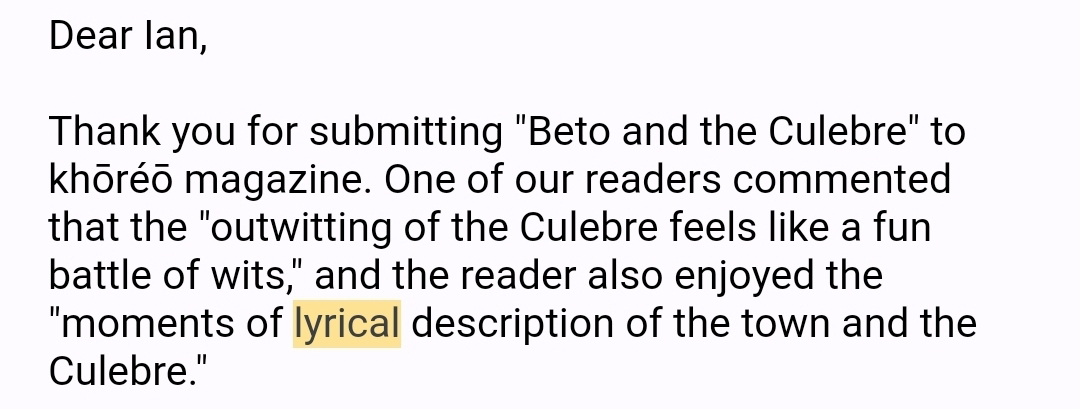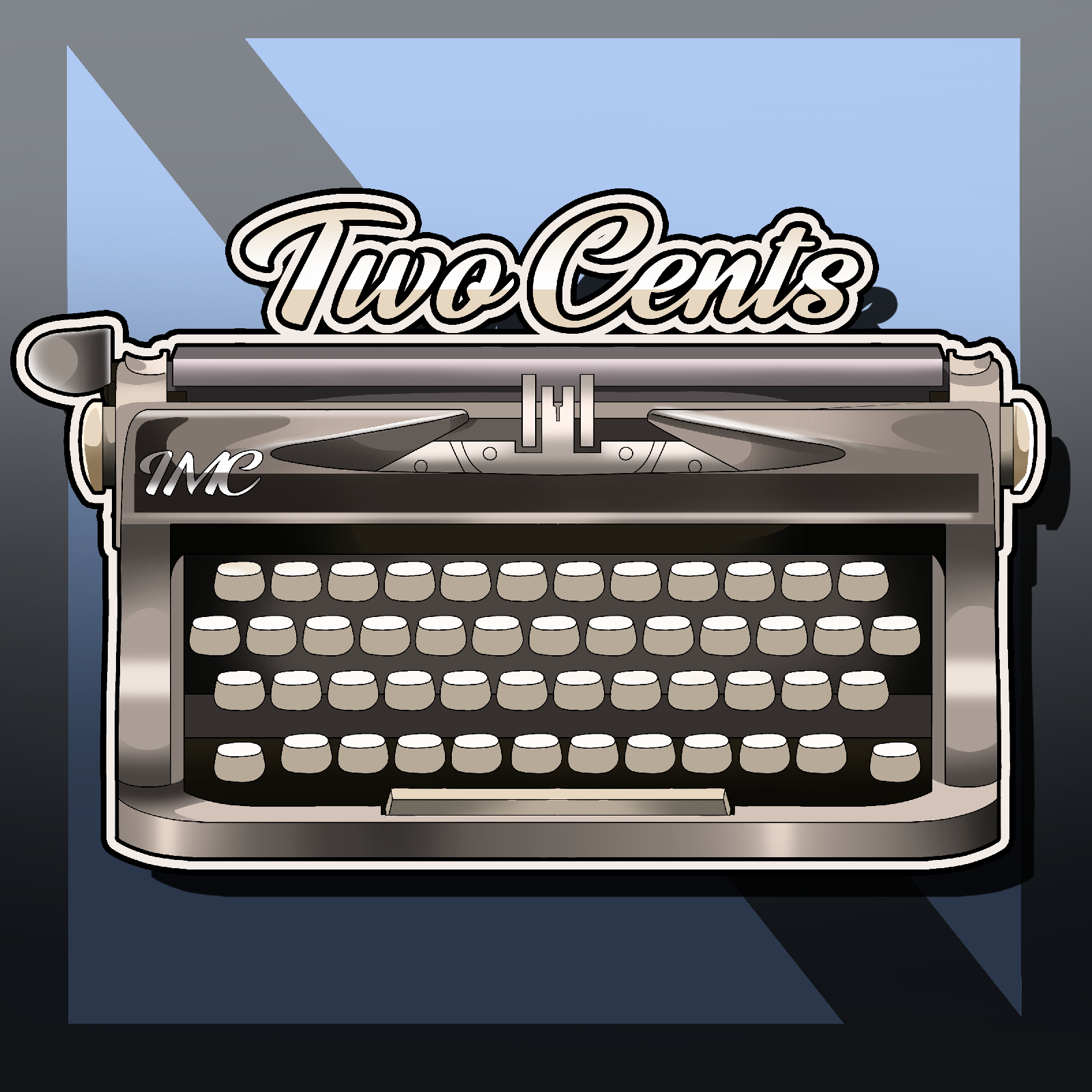Keep Calm and Write On: Persisting in the Face of Rejection
Hello Funny People,
Apologies for springing this extra blog post on y'all, but some recent good news gave me an itch to talk about something important (in my opinion).
One of Flash Point SF's logos
First, the News
So, if you follow me on social media, you'll already have heard the good news. I cracked a new short story market. Flash Point Science Fiction (FPSF), a popular semi-pro speculative fiction market that specializes in publishing flash fiction (stories of 1000 words or less), recently accepted my story "The Culebre of San Moreno," for publication later this September. This acceptance was a big coup for me for multiple reasons, some of which include the following:
1. It's my first sale to FPSF. Thus far, I've snagged repeat sales to two markets I've sold to previously (those being Wyngraf and Cloaked Press), but this sale means I potentially have another venue that might be open to my work in future, which is always useful to a writer with a still-nascent career like mine.
2. Though it's my first sale, it's not my first submission to them. Last year, during my short fiction submission frenzy, I submitted to FPSF 5 times while they were open to general submissions (I have the rejection slips to prove it). In fact, often, I'd send them a story shortly after Daily Science Fiction (DSF)—sadly now defunct—rejected it. I never got less than a personalized rejection from them though, nearly always filled with warm compliments and useful tips for future revisions.
3. Technically, I'd sent them this story once before. As I said in my social media posts, "Culebre..." underwent 3 major revisions before it finally sold, and with those revisions, it also underwent 3 title changes. The first version, the one FPSF saw first, they turned down on the basis of several factors. Rather than me summarizing them though, you can read them yourself below.
(I have a feeling that atrocious first title didn't help matters.)
Subsequently, I revised the piece enough to the above specifications. The second version, however, also failed to hook any acceptances. That said, I must've done something right because it too collected a number of personal rejections that were highly complimentary. Just have a look at the two below from the magazine Orion's Belt and khōréō magazine.
Those rejections had me floating for a week.
In the end it was the third revision that did it, and despite the fact that I'd shown a previous iteration of the tale to FPSF before, they finally took it.
4. Despite my revisions, this piece was turned down a total of 32 times. I'll repeat that once more for those of you who were distracted by the pain of your jaws hitting the floor: 32 times. 32 editors of 32 other periodicals and anthologies, turned this piece down.
Now, in this case, I won't name names, but I will mention reasons.
One place turned it down because it was too dark.
Another turned it down, strangely, because it was too light. (Can't please anyone, can I?)
More so, a third venue turned it away simple because it wasn't experimental enough, which was fair. It's a straightforward, linear narrative with a (sort of) twist ending; I certainly wasn't reinventing literature with that, nor was I trying to do so.
Another still turned it down for twofold reasons:
A) That it was flash fiction and they didn't publish much of that (again, fair enough).
B) Because of a matter of word choice on my part. (I'd used the words evening lights, which made them think of electric lights, and they didn't publish anything that smacked of modernity.)
Still, I kept the piece out there, and soon y'all will get to read it.
The Revision Process
The first version of this piece—as stated in the first FPSF rejection above—was titled "How Pan Dulce Saved San Moreno,"...which is, frankly, a horrible title and totally gives away the (so-called) twist ending. However, it was a title chosen in haste. I originally wrote this piece to have something to send to them last April before their submission window at the time closed. More so, though the bones of the story were there from the first draft, it was rough, prose-wise. I don't claim to be an elegant writer all the time, but I do try to sand off the rough edges when possible. Unfortunately, in my haste, I failed to do so.
After getting it back from several other places, I decided to go over it again, with the goal to implement the best feedback I'd received for it. This included most of what FPSF's editors had said in their above rejection. I also endeavored to find a better title, one that wouldn't give away the twist at the end.
This refined version became "Beto and the Culebre," which had a bit more of a fairy tale-like quality to it, reminiscent of "Goldilocks and the Three Bears," or "Jack and the Beanstalk." I was content with it. Again, however, despite the polished shine, it still didn't attract any success.
This is where the worst of my frustration began to settle in. To paraphrase the late Dr. Maya Angelou, there's nothing worse than bearing an untold story in your heart. Certainly that's true, but I think equally as painful is bearing a good unpublished story in your files. However, such was my determination that I kept the story out there.
Then I had a revelation.
Perhaps the reason people weren't responding to the story was because they weren't connecting to the character, Beto. Now, in flash fiction, it's difficult to properly develop a character, but it's still possible to some degree, and after a handful more of rejections, I began to question if Beto had enough depth to him. Conclusion: he didn't.
Like many writers, I tend to default to writing characters reflective of my own gender (cis men, in my case). I still have to make a conscious effort to write away from that perspective. Partly due to fear of failure to do it well, partly due to feeling it isn't my place to write characters who are so different from me. I'm making progress, but it remains something at which I'm still trying to do better. However, in this case, I decided to take a chance.
I asked myself, "What if Beto weren't a man? What if, instead, they were a woman? More so, what if they weren't just any woman, but an older woman? How would that change the story?" The only way I'd find out is if I rewrote the story.
Subsequently, Beto became Berta, an older woman, who was a fantastic baker, but needed a cane to get around easily, especially on long hard treks. The people of San Moreno called her abuela de todos, or everyone's grandmother, a beloved figure of the pueblo, whom no one wanted to lose. But Berta, being the responsible elder of the pueblo, saw it as her duty to make sure the young didn't suffer.
Suddenly the story had greater emotional weight, and what followed had added logic underpinning it. After all, a young man might (foolishly) try to overpower a foe, even if they knew they stood no chance. An elderly woman, however, whose age had robbed her of much of her strength, wouldn't act that way. She'd take a more cunning, subtle approach to dealing with this pest once and for all—and if it didn't work, at least the young wouldn't suffer.
I then gave the story a new title, "The Culebre of San Moreno," and set about to see it in print. And it finally happened.
Okay. What's Your Point?
I talk at length about this small success of mine because it proves the value of two things I've come to believe are vital to a writer's career:
1. The ability to revise
2. The drive to not give up
The tidbits that the editor's of FPSF gave me were the fulcrum point between seeing this story waste away in my files, unread by anyone but me, and seeing it in print. Being able to revise, to make the story more satisfying to a reader, was crucial to this eventual success. Even if you're someone capable of producing a fairly clean first draft, being able to rewrite well based on helpful suggestions from readers and critics is a vital tool to have at hand. That means being able to take criticism well, even if it's painful at first. It's necessary to be able to do so.
Then there's old fashioned doggedness.
When I told people this piece had been rejected 32 times, many of them were awed at my persistence. I wasn't though. I had faith in this little story; I knew it was good, and I knew if I placed it in the hands of the right editors, it would find its way into the world. Even in those rejections, the editor's who turned it down because it didn't fit their periodical's vibe recognized in their comments that there was something good about it. So, if they could see it, I saw no reason why I shouldn't believe there was something good about it too.
There's an saying, "A professional writer is an amateur who didn't quit." More so than talent, I've come to believe that persistence is far more important to a writer's eventual success. It's tough in the submission and query trenches, and it takes a mettle stronger than steel to be able to withstand the agonies that one encounters within them.
You have to outlast the lows, and if you manage to do so, the highs become all the more rewarding.
"The Culebre of San Moreno" will go live on the FPSF website later this September, and it would mean the world to me if you read it.
— IMC 🙃






Comments